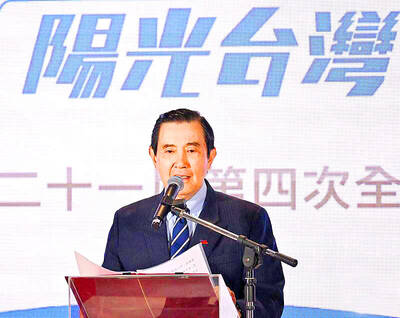Aquaculture researchers from National Taiwan University (NTU) say that genetic analysis is yielding new insight into the workings of a virus that has devastated shrimp stocks in the nation since it was discovered in 1992.
Although her team is working on a way of inoculating shrimp against the dreaded White Spot Syndrome Baculovirus Complex(WSSV), aquaculture researcher Lo Chu-fang (羅竹芳) said that there was much Taiwanese shrimp farmers could do to overcome the disease through better aquaculture practices.
"We found that during periods of stress, the level of WSSV increases in the shrimp's body at an astonishing rate," Lo said. "For instance, we have observed virus levels increasing 100,000-fold during spawning, which is a stressful event."
Local shrimp-rearing methods put a lot of stress on shrimp stocks because local shrimp farmers tend to adopt a very intensive approach, Lo said.
"We are talking about keeping up to a million shrimp per hectare of aquaculture pond whereas abroad 300,000 to 400,000 is the norm," Lo said.
She said that not only were crowded shrimp more susceptible to WSSV, the conditions may have actually caused the condition in the first place.
"WSSV did not appear until 1992," said Lo, who has been working on the virus for many years. "Our research found that previously the virus was an obscure and largely harmless one affecting certain species of crab."
However, once the virus started affecting farmed shrimp, it spread rapidly.
"They say that WSSV spreads as the wind blows," Lo said.
Major asian shrimp production areas are affected, including Thailand and China. However, Australia remains unaffected by WSSV.
Lo's research, which includes the discovery of a way of testing for WSSV, has helped some shrimp producers abroad drastically reduce losses to WSSV from up to 80 percent to less than 5 percent.
Paradoxically, Taiwanese producers have been slower to adopt the researchers' advice, Lo said.

ENDORSING TAIWAN: Honduran presidential candidate Nasry Afura said that Honduras was ‘100 times better off’ when it was allied with Taipei The Ministry of Foreign Affairs yesterday said it would explore the possibility of restoring diplomatic relations with Honduras based on the principle of maintaining national interests and dignity. The ministry made the remarks in response to reporters’ questions regarding an article titled: “Will Taiwan Regain a Diplomatic Ally?” published in The Diplomat on Saturday. The article said Honduras’ presidential election in November could offer Taiwan the chance to regain an ally, as multiple candidates have promoted re-establishing diplomatic relations with Taiwan. Honduras severed diplomatic ties with Taiwan in March 2023 in favor of Beijing, but since switching its diplomatic recognition,

A fourth public debate was held today about restarting the recently decommissioned Ma-anshan Nuclear Power Plant, ahead of a referendum on the controversial issue to be held in less than two weeks. A referendum on Aug. 23 is to ask voters if they agree that “the Ma-anshan Nuclear Power Plant should continue operations upon approval by the competent authority and confirmation that there are no safety concerns.” Anyone over 18 years of age can vote in the referendum. The vote comes just three months after its final reactor shut down, officially making Taiwan nuclear-free. Taiwan People’s Party Chairman Huang Kuo-chang (黃國昌) represented

Scoot announced yesterday that starting in October, it would increase flights between Taipei and Japan’s Narita airport and Hokkaido, and between Singapore and Taipei. The low-cost airline, a subsidiary of Singapore Airlines, also said it would launch flights to Chiang Rai in Thailand, Okinawa and Tokyo’s Haneda airport between December and March next year. Flights between Singapore and Chiang Rai would begin on Jan. 1, with five flights per week operated by an Embraer E190-E2 aircraft, Scoot said. Flights between Singapore and Okinawa would begin on Dec. 15, with three flights per week operated by Airbus A320 aircraft, the airline said. Services between Singapore

‘ANGRY’: Forgetting the humiliations and sacrifices of ‘the people of the Republic of China’ experienced disqualified Lai from being president, Ma Ying-jeou said Former president Ma Ying-jeou (馬英九) yesterday criticized President William Lai (賴清德) over what he called “phrasing that downplayed Japan’s atrocities” against China during World War II. Ma made the remarks in a post on Facebook on the 80th anniversary of the end of World War II. Ma said he was “angry and disappointed” that Lai described the anniversary as the end of World War II instead of a “victory in the war of resistance” — a reference to the end of the Second Sino-Japanese War (1937-1945). The eight-year war was a part of World War II, in which Japan and the other Axis